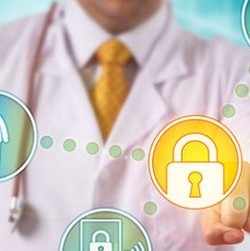How your IT Company Can Help You Secure Patient Data

News regarding medical data breaches that disclose the medical and personal information records of patients and consumers alike, seem to continuously emerge at a alarming rates, yet these attacks shouldn’t really come as a surprise. This type of data is extremely valuable and fetch a very competitive price on the Dark Web & Black Markets, which makes medical facilities and medical billing companies great targets for hackers typically because smaller businesses are known not to have the robust defense-in-depth Cybersecurity that larger organizations typically have in place.
Counter this by arming your company and employees with better systems and protocols, such as:
Routine Access Monitoring
Because employees are more likely to be fooled by Phishing scams and other cyber threats it is extremely important to control access to protected health information (PHI), your IT provider should be introducing guidelines and restrictions which keep employees without proper authorization from looking where they shouldn’t be and end up tempted financially. In fact, a Verizon report discovered that healthcare is the only sector where employees present the biggest cyber threat, with 58% of events implicating insiders.
Healthcare execs must also have their staff undergo continuous security training and enforce administrative policies where they’re disciplined if they try to access confidential patient data without valid business-related reasons.
Full-disk encryption
Full-disk encryption (FDE) is an inexpensive and quick method to secure private information. It even alleviates the effects of stolen physical assets by restricting reporting requirements and fines.
Even though this recommendation is old news to the healthcare sector, the recent shift to greater mobility should make this a priority more than ever, particularly because stolen or lost devices pose a massive security risk.
Let’s say a healthcare provider’s laptop got stolen. The thief could easily disclose all employee PHIs on the city’s health plan. Encrypted devices would never be subjected to such a scenario.
Resilient infrastructure
Your primary goal is to keep cyberthreats out, but reducing the effect on the network when a hacker has already infiltrated it is just as important. Since email and websites are the most common conduit for Malware, you need to set up systems that will contain these threats.
You must not allow the infected device to spread the virus to more of your crucial assets, and don’t ever use devices with high-availability requirements to receive external email or to surf the web. In case such systems fail though, you’d also need to come up with a recovery plan so you can still take care of your patients despite a major incident.
Always remember that your patients already trust you with their life, so you must do everything you can to protect their privacy, too. If the above approaches sound way too technical for you, just give us a call and we’ll make sure these cybersecurity measures have your back.
